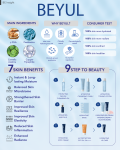Infertility can be due to so many different factors, but one thing for sure is that the right nutrient intake is very important to produce healthy sperm, eggs, or to support pregnancy.
One of the most talked about nutritional food supplements today is spirulina. Its superior nutritional content provides a wide variety of vitamins and minerals, all of which are easy for the body to absorb. Apart from boosting daily nutritional intake, is this super nutrient suitable for supporting pregnancy and will it further increase the fertility in men & women?
WHAT IS SPIRULINA?
Spirulina is a dietary supplement made from blue-green algae or cyanobacteria, known as Arthrosporic platensis.
This blue-green algae is cultivated in a controlled environment to ensure zero contamination to the culture medium. This is so that Spirulina will turn out to be a very clean food source.
Spirulina contains 40 to 80% protein content and is considered to be one of the highest quality proteins available when measured against other plant type proteins. It is also an excellent source for vitamins, minerals and antioxidants.
Benefits of Spirulina for Healthy Fertility
In recent years, medical science has begun to closely examine the roles of nutrition and dietary quality in improving fertility for both male and female partners.
Nutrition is an important part in increasing the fertility potential of a person. Studies show that with the right amount of nutrients, the human body naturally enhances its reproductive efforts, the health of a woman’s eggs and a man’s sperm improves, and hormonal function and production balances out.
In addition, a nutrient rich diet on fertility is critical in building up the nutrient stores and supplies necessary for fetus growth and development.
This nutritive plant food Spirulina is an excellent way to support healthy fertility and pregnancy through its superior nutritional content.
A Complete Protein Source
Yes, Spirulina is a complete protein. It contains all the nine essential amino acids that are of rather unique quality as most proteins derived from plants are found lacking in some essential amino acids.
Proteins are composed of amino acids, and the body requires 12 such important amino acids. 9 of which are called “essential” and are required to be consumed from food. Food sources that contain all 9 essential amino acids are labelled as “perfect” or “complete” protein sources. One of these sources is indeed, Spirulina.
Moreover, its status as a plant-based protein source makes it an impressive choice for promoting fertility. Research shows that replacing meat sources of protein with vegetable sources of protein decreases the risk of infertility.
A Wide Variety of Vitamins and Minerals
As we all know, diets are essential to healthy fertility. Spirulina provides a wide variety of vitamins and minerals, all of which are easily absorbed by the body. Easily accessible if you are looking to boost your daily nutritional intake!
Vitamins: A, D, E, K, Thiamine, Riboflavin, Niacin, B6, B12, Folate and Pantothenic Acid.
Minerals: Potassium, calcium, zinc, magnesium, manganese, selenium, iron, copper, and phosphorus. An additional advantage is that spirulina grows in freshwater environments, resulting in a low amount of sodium compared to saltwater plants like seaweed.
Antioxidant May Improve Egg & Sperm Health while Preventing Preeclampsia
A majority of the vitamins and minerals found in Spirulina are antioxidants, which have been shown to protect the body from harmful free radicals. Oxidative damage that derives from free radicals have been shown to contribute to the cause of fertility issues for example luteal phase defect, poor egg and sperm health, as well as weakened immunity.
Researchers from Oasis of Hope Hospital in Tijuana, Mexico, suggest that Spirulina may very well be a natural cure for women with preeclampsia and could even prevent it from occurring altogether. This is because the Phycocyanobilin (PCB) contained in Spirulina have been shown to inhibit NADPH, an oxidant that increases the oxidative stress in both the placenta and vascular system of the mother. Another lead cause of preeclampsia is malnutrition according to the Preeclampsia Foundation.
Essential Good Fats
Spirulina contains essential fatty acids in the form of linolenic acid, linoleic acid, and arachidonic acid. These essential “Good Fats” aid in prostaglandin function which is crucial for hormonal balance and blood pressure regulation (important for pregnancy).
Low Sugar and Starch Content
Spirulina contains a low carbohydrate content that measures at 10-15%. More so, the consumption of spirulina does not spike insulin levels, which makes it much safer for PCOS, or diabetes-related infertility cases.
Sourcing Spirulina & Suggested Use
There are ample spirulina products in the market, so do your research to choose a brand that best fits your needs.
It is always best to follow the suggested guidelines on the product label that you choose.
If you’re pregnant, it is very important you let your doctor know you wish to take spirulina or are taking it. Never exceed suggested dosage for the product you are taking.
Switching to a pure spirulina supplement like Belixz Spirulina is suggested if you wish to use a greener supplement to support pregnancy or to boost fertility.



